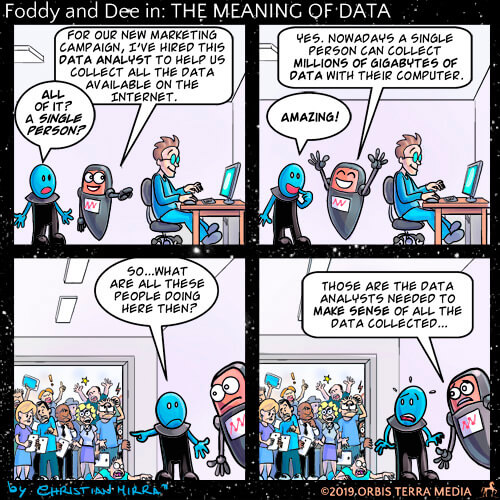The Meaning of Data

Do we all need to be data analysts?
We all understand the potential of marketing data. It has a vital role to play in our understanding and optimisation of all our marketing activities.
We all, also, understand that simply amassing data isn’t enough.
The potential of our marketing data is to be found in its analysis, not in its collection. Our end goal is the derived insights and their application. Yet, when confronted with these lakes of data, the average marketing specialist doesn’t know where to begin.
The solution: data specialists. Analysts who understand the data – its value, cleanliness, usefulness and compilation. Because this requires an understanding of the business context, the best solution is to create task forces dedicated to analysing data within a specific context in order to answer a defined marketing problem.
Where to start?
Given the sheer breadth of automated tools available to marketers today, the hardest part of all can be deciding which metrics to focus on. There are so many different data points in a typical marketing department: web traffic, social media, newsletter etc.
You don’t need to measure everything from day one – much less, store all that data. Focusing on a particular marketing challenge you want to solve, or on a single area where you want to increase engagement, can often help to get the ball rolling.
A relatively small and discreet selection of measurements and data can deliver significant business insight when put in the hands of a talented data analyst.
The obvious place to start is in defining what problem you want to solve and what information you need in order to solve it. If it’s possible to collect that data in real time, even better. This offers an opportunity to combine data sets to establish cause and effect and then trial those findings in a live environment.
By focusing on a single issue where you have delivered demonstrable change/advantage, you set the scene for optimising your marketing activity.
Ideally, you also need to combine your findings with information about ROI. How have your subsequent data-driven actions impacted results and delivered returns for the marketing strategy? In this way, you can demonstrate the financial and operational advantages of data-driven decision-making.
By focusing on a single issue where you have delivered demonstrable change/advantage, you set the scene for optimising your marketing activity. This is an iterative process, where further optimisations are gained over time.
In this way, you can jumpstart the culture change within the marketing department. Once everyone has seen the value of marketing data in actioning real cost savings, improved results or other optimisation, it is easier to establish similar data analytics task forces to solve other marketing challenges.
It may even be that the marketing team members become advocates for a more data-driven culture within the organisation.

